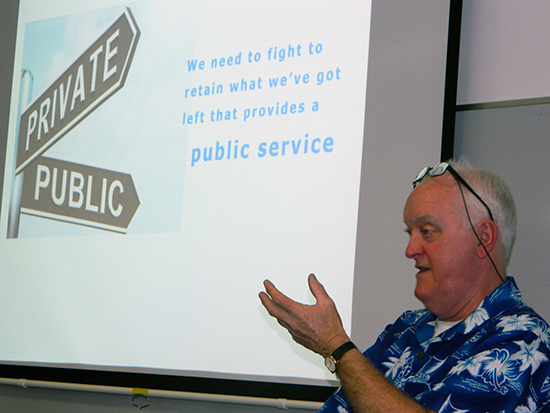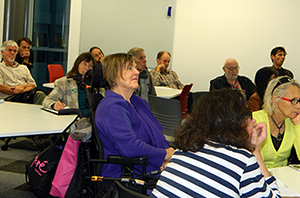
AUCKLAND (Pacific Media Watch): An advocate for an independent New Zealand has warned that a “free press” is under threat in the country and cited examples of alleged media self-censorship over economic issues.
In a public lecture on foreign investment and the potential socio-political impact of the controversial Trans-Pacific Partnership Agreement (TPPA) at AUT University at the weekend, campaigner Murray Horton was highly critical of New Zealand media reporting of economic issues.
He condemned the self-censorship of a national magazine that last month “spiked” a major investigation into foreign investment in land holdings in the South Island.
Declining to name the publication, Horton, organiser of the Campaign Against Foreign Control of Aotearoa (CAFCA), described the investigation as an important expose of land ownership issues since the Overseas Investment Act in 2005 strengthened monitoring of purchases by foreign individuals or companies.
Contrary to a widespread belief about rising Chinese ownership in the country, the spiked investment article showed that “super-rich foreigners snapped up desirable chunks of our country” – and most were US citizens who had bought up an “astonishing” 271,576ha of New Zealand land.
Canadians, Israelis and British buyers were next highest buyers.
Ten percent of New Zealand was now under foreign ownership but China was 11th on the list.
Insufficient scrutiny
Horton criticised New Zealand media for not providing sufficient scrutiny of foreign investment and control issues.
“Don’t take as gospel the language used by the politicians, the media and ‘experts’ about ‘foreign investment’,” he told the packed audience at the lecture organised by the Pacific Media Centre.
“A lot of so-called ‘investment’ is simply a takeover, not creating assets.
“Since the Rogernomics bloodless coup of the 1980s, a driving goal of governments – whether National or Labour – has been ‘to make the New Zealand economy attractive to foreign investment’.
“What this means to ordinary New Zealanders is that we have become, and remain, involuntary competitors in the race to the bottom,” he said.
Horton said ownership meant political power. Foreign control meant “recolonisation, but by company this time, not country”.
When the Crafar Farms sale to Chinese buyers first became a major political issue in 2009, Prime Minister John Key said that he did not want to see New Zealanders “become tenants in our own country”.
“I very rarely agree with anything Key says but I’m happy to quote him on that one,” Horton said.
Upper hand
“In the owner-tenant relationship, there is no doubt who holds the upper hand. I’ve been both a tenant and an owner, and I know which I prefer.”
Horton said Christchurch-based CAFCA’s campaign was advocating a message to “put people back at the centre of the economy”.
He said CAFCA and the partner Anti-Bases Coalition (ABC) group approach was based on four objectives:
- People’s rights before corporate profit
- Public service not private profit
- An independent foreign policy
- No unjust secret treaties
 Horton said the US made “no bones” about the fact that its state – including its covert agencies – existed to serve American interests.
Horton said the US made “no bones” about the fact that its state – including its covert agencies – existed to serve American interests.
“It wants to ram through the TPPA this year, which will greatly benefit US TNCs [trans-national corporations] across the whole economic spectrum,” he said.
Corporate colonisation
“If it wasn’t clear in the past, it sure as hell is now – TNCs and corporate colonisation are very much our issues.”
Horton criticised a “facile claim” by Prime Minister Key that restricting private ownership in public assets to 49 percent provided “some sort of protection”.
“Ever since 1973, the Overseas Investment Act has defined a foreign-owned or controlled company as one with more than 24.9 percent ownership,” he said.
“It doesn’t matter whether than percentage is held by one or more foreign owners, if it totals anything higher than 24.9 percent, it is recognised as a foreign company.”
Horton is touring New Zealand and speaking at a series of public meetings with his critical message about the TPPA. He has already spoken in Auckland, Kaitaia and Whangarei and today moves on to Hamilton.
Video on Murray Horton and the TPPA
This work is licensed under a Creative Commons Attribution-NonCommercial 3.0 New Zealand Licence.




